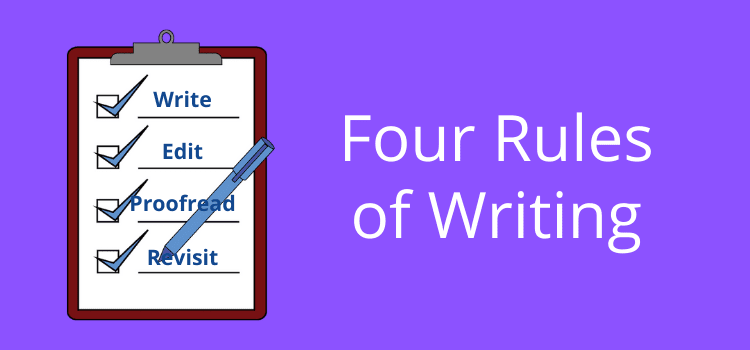
You can find so many writing rules that it can become a little confusing. I could probably list a hundred or more.
But, as with all things, it’s always best to keep things as simple as possible.
You can develop a routine if you have a short set of guidelines to remember and implement for any form of writing.
These simple rules have worked for me for years when I write books, articles, or blog posts.
My four writing rules
Sure, you can make a long list of the punctuation, grammar, and syntax rules of writing.
Then there areliterary devices and techniques, tone, and styles.
But who can remember all of them?
Writing shouldn’t be a complicated process; thinking about rules when writing can only slow you down.
Whatever you write is a product of being creative, and to be creative, you need freedom.
The best way to do this is to keep things simple.
For me, I find it much easier to divide writing into steps that are in a logical progression or order.
When you sit down at your keyboard, you can ask yourself, what am I doing now?
If you can answer your question in one word, you can focus on your task.
Generally, I have only four answers.
1. Writing
You start every new project with a blank page, and the only way to fill it is to write.
At this early stage, all I concentrate on is getting my thoughts and ideas into words and sentences.
If you are writing an article, you can probably complete your writing stage in one or two sittings.
But for a book, it’s going to take you a lot of writing sessions to finish your manuscript.
But in either case, when you are writing, just write. Don’t think about anything else.
Here are a few tips that work for me to stay focused.
Turn off the wi-fi.
There’s nothing worse when writing than having email and message notifications popping up on your screen.
It’s one of my golden writing rules. The world can wait while I get my words out.
Turn off your grammar checker.
Yes, grammar checkers are fantastic tools.
But when you are writing, flashing red lines, warnings, suggestions, and autocorrections are an enormous distraction.
Don’t worry at all about grammar, spelling, and punctuation when you write. All you want to think about is your story.
Don’t overthink.
Agonizing over your word choice or sentence structure will slow you down.
So instead, concentrate on your ideas and leave the tidying up for later.
There’s nothing you can do to improve a blank page.
But you will have a lot of great material to work with later when you have written 2,000 words.
Don’t set time limits.
Yes, I know some writers like to set regular writing sessions.
But for me, I like to write when I can and don’t set myself a rigid time frame.
A lot is happening around us, and it’s not always possible to have the clear space and time to write.
Write when you can and enjoy it.
When you finish writing, it’s time to move on to the next stage.
2. Editing
Now you can turn on your grammar checker and get to work.
It doesn’t matter if you have written a 1,500-word article or a 75,000-word book; you’ll have plenty of work to do.
There’s a lot to check, but trying to remember all the grammar rules for writers is never going to get you very far.
The best way to tackle your editing stage is by taking it one sentence at a time.
In your first editing session, look for the obvious things first, such as spelling mistakes and basic grammar errors.
Once you complete that, you can go back to the beginning and start again to improve your punctuation, rewrite sentences, or make changes to your syntax.
Don’t try to do everything in one edit. It’s easier to concentrate on only a few elements at a time.
It might take you two or three edits or even more before you’re happy that you found most errors and made your improvements.
3. Proofreading
You might be sending your writing off to an editor or proofreader. But you still have to proofread your writing before you do.
If you don’t have outside help, then it’s vital that you carefully proofread your work before you publish your writing.
You can read my earlier article that goes into all the details of proofreading.
But here are some of the basics of effective proofreading.
1. Find a quiet time and place to make sure you are not interrupted.
2. Read slowly and check every word.
3. If you can, print out your work. Proofreading on paper is much easier than on a screen.
4. Break up your work into sections or chapters.
5. Read your text out of order. Perhaps from the last paragraph and work your way back to the first paragraph.
6. Read aloud and listen to your words.
Take your time, and never rush your proofreading stage.
For most writers, that’s it. You’ve finished your article, book, short story, or essay.
But I have one more stage that many writers may not consider.
4. Revisiting
Going back and checking what you have already published is very good practice.
You might think that it only applies to blog posts and articles. But it is just as important for novels and books.
You can always improve or update any writing you have published.
I have re-checked, improved, and republished many of my books over the years.
But for my articles and blog posts, it’s an ongoing process.
Just on this site alone, there are over 700 articles that I try to keep relevant and up to date.
Every week I strive to revisit around 20 articles to check for possible improvements.
And even though I am a stickler for proofreading, I sometimes come across errors that I missed.
There is always something you can do to improve any piece of writing, so make it a habit to revisit.
Because so much of what we write is published online, you always have the option to republish a book or an article.
Summary
If you like, my four rules of writing are simply stages.
But I find that knowing what I am doing helps me concentrate on the task at hand.
When I write, I write. When I edit, I edit. The worst thing you can do is mix things up.
If you try to edit while you write, it’s a great way to slow your writing down to almost a grinding halt.
When you edit, if you start adding a bunch of additional paragraphs, you lose focus on finding errors.
You can certainly take notes while proofreading but don’t try to rewrite or edit your piece at the same time.
But when it comes to my rules of writing, revisiting is my favorite. Don’t think that your writing stops once you publish.
You can always make it better.
Related reading: 10 Common Writing Myths Every New Writer Should Ignore




Good common sense article. Thank you for sharing.
All good advice methinks. I follow a similar process.
Easy to digest rules. Thanks for sharing!